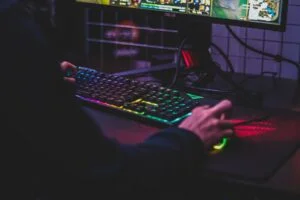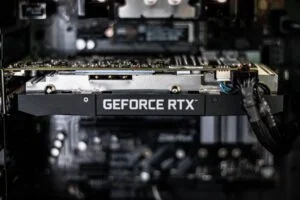Gone are the days when gaming was limited to consoles and specialized gaming devices. Nowadays, PC gaming has become increasingly popular, offering a wide range of games and the ability to customize your gaming experience. However, to truly enjoy the full potential of your games, it’s important for you to know how to optimize your PC for gaming.
How To Optimize Your PC For Gaming?
Well, there are distinct hardware and software optimization strategies that you can utilize to ensure your gaming PC is well-optimized and well-prepared for seamless gaming performance.
Suggested Article: Mastering the Game: Exploring the Pinnacle of Gaming Laptops
How to optimize your PC Hardware?
Optimizing your PC hardware can give your gaming machine the processing power it needs for top-notch performance. Here’s how to optimize your PC Hardware effectively:
1. Upgrade your hardware.
If your PC is old or outdated, it may not be able to handle the latest games. Consider upgrading your CPU, GPU, and RAM to improve your gaming performance. When upgrading your hardware, make sure to choose components that are compatible with each other and that will meet your gaming needs. You can also consider overclocking your CPU or GPU to get even better performance. However, overclocking can be risky and can damage your hardware if not done properly.
2. Install the latest drivers.
Outdated drivers can cause performance problems in games. Make sure you have the latest drivers for your graphics card, sound card, and other hardware. You can usually download the latest drivers from the manufacturer’s website. If you’re not sure how to install drivers, there are many tutorials available online.
3. Use a gaming mouse and keyboard.
- A gaming mouse and keyboard can give you a competitive edge in games. They are designed for precision and speed, and they often have features that can improve your gaming experience. Some features to look for in a gaming mouse include:
- A high polling rate (the number of times the mouse reports its position to the computer per second)
- A high number of buttons
- Adjustable weights
- Some features to look for in a gaming keyboard include:
- A mechanical switch design
- A high number of keys
- Anti-ghosting (the ability to press multiple keys at the same time without any of them registering as missed)
4. Clean up your hard drive.
A cluttered hard drive can slow down your PC. Delete old files and programs that you don’t need to free up space. You can use a disk cleanup tool to delete unnecessary files. You can also uninstall programs that you no longer use.
5. Close unnecessary programs.
When you’re gaming, close any programs that you’re not using. This will free up resources and improve your gaming performance. You can use the Task Manager to see what programs are running and to close them.
6. Use a cooling system.
If your PC is overheating, it can cause performance problems. Use a cooling system to keep your PC cool and running at its best. There are many different types of cooling systems available, including air coolers, liquid coolers, and AIO coolers. Choose a cooling system that is appropriate for your PC’s needs.
7. Overclock your CPU.
Overclocking your CPU can improve its performance, but it increases heat output. Only overclock your CPU if you have a good cooling system. To overclock your CPU, you will need to change the settings in your BIOS. There are many tutorials available online that can help you overclock your CPU safely.
8. Use a gaming monitor with a high refresh rate
A high refresh rate will give you a smoother gaming experience, especially in fast-paced games. A refresh rate of 120Hz or 144Hz is ideal for most gamers.
Here are some additional tips that are specific to optimizing your PC hardware for gaming:
- Use a solid state drive (SSD) for your operating system and your favorite games. SSDs are much faster than traditional hard drives, which can lead to a significant improvement in game loading times and overall performance.
- Configure your graphics settings in your games to get the best possible performance. There are many different settings that you can adjust, so it’s important to experiment to find the best settings for your PC and your games.
Suggested Article: Gaming Microphones for PC

How to Optimize Your PC Software?
I have shared with you some strategies that I personally used to tune up my gaming PC performance. So if you’re wondering how to optimize your PC Software for the seamless performance of your gaming rig. Well, try these and I’m sure you will be astonished by the results.
1. Check for updates
Make sure you have the latest updates for your operating system, graphics drivers, and other software. You can check for updates in the Windows Update settings or by going to the website of the software manufacturer. Outdated software can cause performance problems in games, so it’s important to keep everything up to date.
2. Optimize your game settings
There are many different settings that you can adjust in your games to improve performance. Some of the most important settings to consider include:
- Frame rate: This is the number of frames per second that your game is rendering. A higher frame rate will give you a smoother gaming experience, but it will also require more processing power.
- Graphics settings: These settings control the visual quality of your game. Reducing the graphics settings can improve performance, but it will also reduce the visual quality.
- Resolution: This is the number of pixels that your game is being rendered at. A higher resolution will give you a sharper image, but it will also require more processing power.
3. Close background processes
Any programs that are running in the background can use up processing power and memory, which can impact your gaming performance. Close any programs that you’re not using before you start gaming. You can use the Task Manager to see what programs are running and to close them.
4. Use the NVIDIA Control Panel to optimize your graphics settings
Use the NVIDIA Control Panel to optimize your graphics settings: The NVIDIA Control Panel has a number of features that can help you improve your gaming performance, such as the ability to optimize your settings for specific games and to use the NVIDIA GeForce Experience to automatically optimize your settings.
5. Use a performance mode
Many gaming laptops have a performance mode that can improve gaming performance by disabling unnecessary features and processes. To enable performance mode, you will need to check your laptop’s manual or look for a performance mode setting in the BIOS.
6. Use a wired connection for online games
A wired connection will provide a more stable connection and reduce lag, which can improve your performance in online games. If you’re playing online games, make sure you’re connected to a wired network instead of using Wi-Fi.
7. Optimize your power settings
Make sure your PC is set to high-performance mode when you’re gaming. This will ensure that your PC is using all of its resources to give you the best possible performance. To set your PC to high-performance mode, go to the Control Panel and search for “power options.” Then, click on “Change plan settings” for the power plan that you’re currently using. Finally, click on “Change advanced power settings” and set the “Processor power management” setting to “Maximum performance.”
8. Reinstall your games
If you’re still having performance problems, you can try reinstalling your games. This can sometimes fix corrupt files or other issues that can cause performance problems. To reinstall a game, simply uninstall it from your PC and then reinstall it from the game’s disc or from the game’s website.








